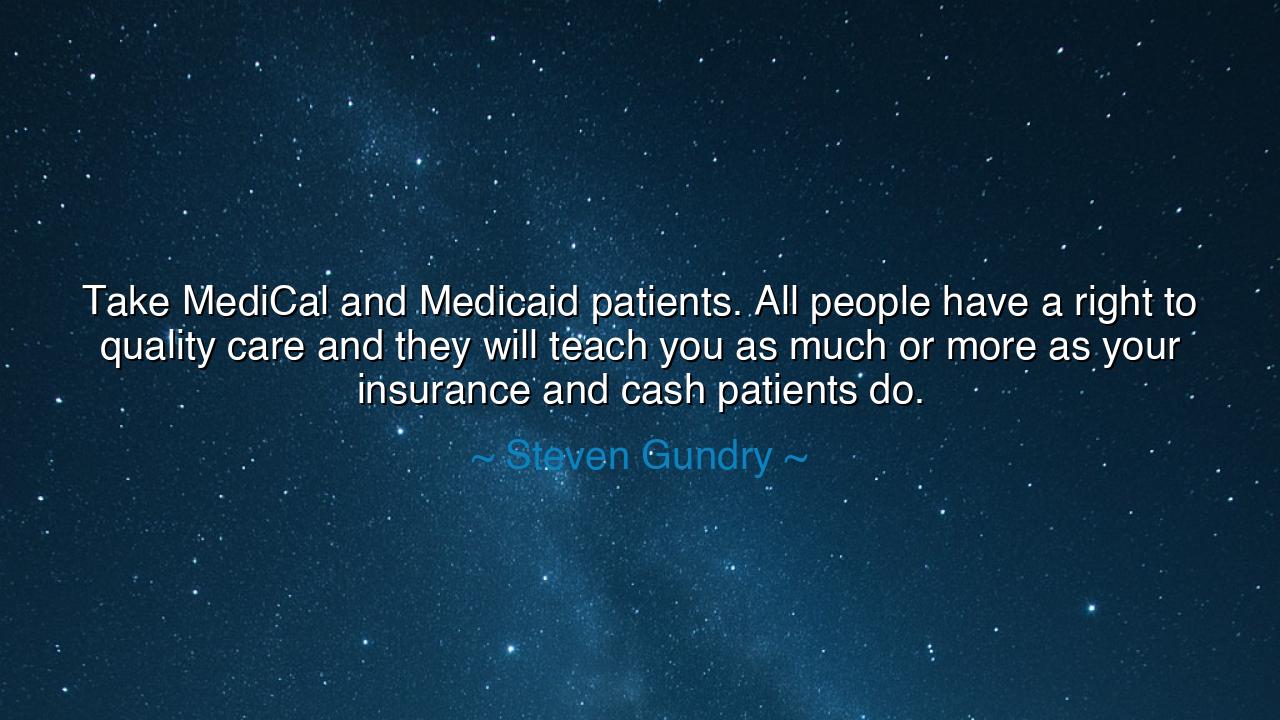
Take MediCal and Medicaid patients. All people have a right to
Take MediCal and Medicaid patients. All people have a right to quality care and they will teach you as much or more as your insurance and cash patients do.






“Take MediCal and Medicaid patients. All people have a right to quality care, and they will teach you as much or more as your insurance and cash patients do.”
Thus spoke Dr. Steven Gundry, physician, scholar, and healer of hearts — not only in the bodily sense, but in the spiritual one. His words, though addressed to those who practice medicine, reach far beyond hospitals and clinics. They speak to the timeless duty of compassion — the truth that all human beings, regardless of their station or wealth, are equal in dignity and deserving of care. In this declaration lies an ancient echo: that the true healer serves not for profit, but for purpose, and that the wisdom of medicine is as much learned from the poor as from the privileged.
The origin of these words lies in the modern landscape of American healthcare, where inequality often stands between illness and healing. MediCal and Medicaid, programs created to serve those of limited means, symbolize society’s promise that the sick shall not be abandoned for lack of gold. Yet, too often, physicians refuse such patients — not from cruelty, but from fear of bureaucracy, low reimbursement, or exhaustion. Dr. Gundry’s counsel strikes against this tide. He calls upon healers to remember the ancient covenant of their profession — the oath of Hippocrates, who swore to treat all who suffer. In reminding his students and peers to embrace the poor and vulnerable, he reawakens the moral pulse that beats beneath the science of medicine.
When he says, “They will teach you as much or more as your insurance and cash patients do,” he speaks to a deeper kind of education — one not found in textbooks or laboratories. For those who struggle, who live without comfort or privilege, often reveal truths that comfort conceals. Their endurance becomes the teacher, their gratitude the reward, their humanity the lesson. To care for the humble is to glimpse the sacredness of service itself. In such encounters, the physician learns humility — that healing is not a transaction, but a relationship, a sacred bond between two souls who share the fragile gift of life.
Consider the story of Dr. Albert Schweitzer, the great physician and humanitarian who left Europe’s cathedrals and concert halls to serve the sick in the jungles of Africa. There, among the poor and forgotten, he found not only his patients’ suffering but his own enlightenment. “I don’t know what your destiny will be,” he once said, “but the only ones among you who will be truly happy are those who have sought and found how to serve.” Schweitzer’s life was a living echo of Gundry’s wisdom — that to treat the least of society is to become greatest in spirit, that to give care freely is to receive knowledge beyond measure.
Dr. Gundry’s words also speak to the moral crisis of modern healing — a world where medicine, once the most sacred of callings, too often bends under the weight of commerce. He reminds his fellow healers that their true wealth is not counted in dollars, but in the lives touched, the pain eased, the lessons learned. The right to quality care is not a privilege granted by wealth, but a birthright granted by existence itself. When a physician closes his door to the poor, he closes his heart to his own humanity. But when he opens it, he finds not a burden, but a blessing.
From this teaching flows a lesson for all, not only for doctors. Whatever your craft — whether you build, teach, write, or lead — remember that wisdom often dwells in the places society overlooks. Do not serve only those who can reward you; serve also those who cannot. For it is in the company of the struggling, the grateful, and the forgotten that the soul is sharpened and made whole. As the ancients taught, “To serve the lowly is to walk among the gods.”
So, let this truth be passed down to every generation: the true measure of greatness is not who one serves, but how one serves. Whether in the gleaming halls of wealth or the humble corridors of need, the heart that acts from compassion stands nearest to the divine. As Dr. Gundry reminds us, the poor may lack riches, but they bring with them the richest gift of all — the reminder that every life, however small or broken, is sacred. To heal one such life is to fulfill the oldest commandment of humankind: to love, to serve, and to learn.






AAdministratorAdministrator
Welcome, honored guests. Please leave a comment, we will respond soon